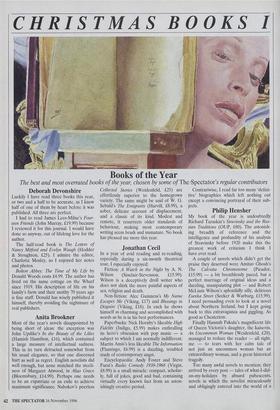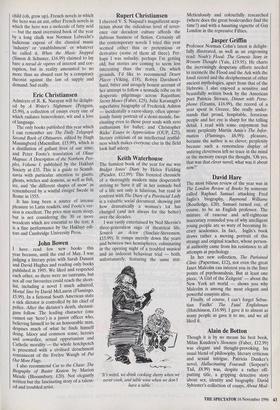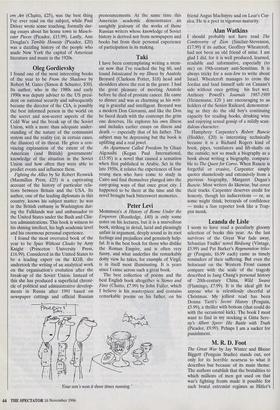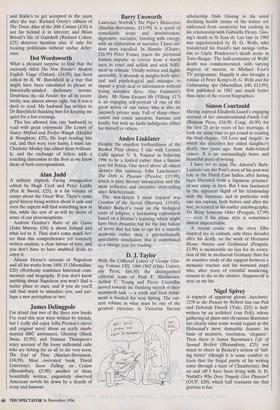CHRISTMAS BOOKS I
Books of the Year
The best and most overrated books of the year, chosen by some of The Spectator's regular contributors child (oh, grow up), French novels in which the hero was an ant, other French novels in which the hero was a molecule of fatty acid — but the most overrated book of the year by a long chalk was Norman Lebrecht's ludicrous exposé of the classical music `industry' or 'establishment' or whatever he called it. When the Music Stopped (Simon & Schuster, £16.99) claimed to lay bare a nceud de vtperes of interest and cor- ruption, but in reality amounted to no more than an absurd rant by a conspiracy theorist against the law of supply and demand. Sad really.
Eric Christiansen
Admirers of R. K. Narayan will be delight- ed by A Writer's Nightmare (Penguin, £5.99), a collection of essays every one of which radiates benevolence, wit and a love of language.
The only books published this year which I can remember are The Daily Telegraph Second Book of Obituaries, edited by Hugh Massingberd (Macmillan, £15.99), which is a distillation of gallant lives of our time; and Peter Foote's translation of Olaus Magnus: A Description of the Northern Peo- ples, Volume I, published by the Hakluyt Society at £35. This is a guide to Scandi- navia with particular attention to giants, ghosts, witches and demons, as well as fish, ice, and 'the different shapes of snow' as remembered by a wistful émigré Swede in Rome in 1555.
It has long been a source of intense pleasure to Latin readers, and Foote's ver- sion is excellent. The price may seem steep, but is not considering the 30 or more woodcuts which are essential to the text; it is a fine performance by the Hakluyt edi- tors and Cambridge University Press.
John Bowen
have read few new books this year because, until the end of May, I was judging a literary prize with Sarah Dunant and David Hughes and reading only books published in 1995. We liked and respected each other, so there were no tantrums, but not all our favourites could reach the short- list, including a novel I much admired, Mortal Sins by David McLaurin (Flamingo, £5.99). In a fictional South American state a sick dictator is controlled by his chief of police. After the dictator's death, shenani- gans follow. The leading character (one cannot say 'hero') is a junior officer who, believing himself to be an honourable man, despises much of what he finds himself doing. Idiocy and common sense, heroics and cowardice, sexual opportunism and Catholic morality — the whole hotchpotch is presented with a civilised detachment reminiscent of the Evelyn Waugh of Put Out More Flags. I also recommend Cut to the Chase: The Biography of Buster Keaton by Marion Meade (Bloomsbury, £20). Not elegantly written but the fascinating story of a talent- ed and troubled artist.
Rupert Christiansen
I cheered V. S. Naipaul's magnificent scep- ticism about the ridiculous level of rever- ence our decadent culture affords the dubious business of fiction. Certainly all the contemporary novels I tried this year seemed either thin or pretentious or derivative (some of them all three). Per- haps I was unlucky, perhaps I'm getting old, but stories are coming to seem less interesting than the truth. On which grounds, I'd like to recommend Desert Places (Viking, £18), Robyn Davidson's hard, bitter and savagely honest account of her attempt to follow a nomadic tribe on its desperate pilgrimage across Rajasthan; Secret Muses (Faber, £25), Julie Kavanagh's superlative biography of Frederick Ashton — incidentally a razor-sharp, often uproar- iously funny portrait of a demi-monde, fas- cinating even to those poor souls with zero enthusiasm for ballet; and Christopher Ricks' Essays in Appreciation (OUP, £25), literary criticism of an intellectual zestful- ness which makes everyone else in the field look half asleep.
Keith Waterhouse
The funniest book of the year for me was Bridget Jones' Diary by Helen Fielding (Picador, £12.99). This frenzied chronicle of a thoroughly modern miss desperately striving to 'have it all' in her unmade bed of a life not only is hilarious, but read in contrast with The Diary of a Provincial Lady is a valuable social document, showing just how dramatically a woman's lot has changed (and not always for the better) over the decades.
I was vastly entertained by Ned Sherrin's three-generation saga of theatrical life, Scratch an Actor (Sinclair-Stevenson, £15.99). It romps merrily down the years and between two hemispheres, culminating in the opening night of a troubled musical and an indecent behaviour trial — both, unfortunately, featuring the same star.
`It's weird, we drink cooking sherry when we never cook, and table wine when we don't have a table.' Meticulously and colourfully researched (where does the great boulevardier find the time?) and with a haunting vignette of Gay London in the repressive Fifties.
Jasper Griffin
Professor Norman Cohn's latest is delight- fully illustrated, as well as an engrossing read: Noah's Flood: The Genesis Story in Western Thought (Yale, £19.95). He charts the increasingly desperate efforts needed to reconcile the Flood and the Ark with the fossil record and the decipherment of other ancient mythologies, apart from that of the Hebrews. I also enjoyed a sensitive and beautifully written book by the American poet Patricia Storace, Dinner with Perse- phone (Granta, £16.99), the record of a year spent in Greece. She really under- stands that proud, hospitable, ferocious people and her eye is sharp for the telling detail. I read with some enjoyment but more perplexity Martin Amis's The Infor- mation (Flamingo, £6.99): pleasure, because the author is so clever; perplexity because such a remorseless display of untiring cleverness left no trace in the mind or the memory except the thought, 'Oh yes, that was that clever novel; what was it about now?'
David Hare
The most bilious review of the year was in The London Review of Books by someone called Raphael Samuel attacking Fred Inglis's biography, Raymond Williams (Routledge, £20). Samuel turned out, of course, to be an English professor. The mixture of rancour and self-righteous inaccuracy reminded you of why intelligent young people are so wary of becoming lit- erary academics. In fact, Inglis's book draws rather a moving portrait of this strange and original teacher, whose person- al authority came from his resistance to all attempts at psychology.
In her new collection, The Purloined Clinic (Papermac, £12), not even the great Janet Malcolm can interest you in the finer points of psychoanalysis. But at least one piece, 'A Girl of the Zeitgeist' — about the New York art world — shows you why Malcolm is among the most elegant and powerful essayists alive.
Finally, of course, I can't forget Sebas- tian Faulks' The Fatal Englishman (Hutchinson, £16.99). I gave it to almost as many people as gave it to me, and we all liked it.
Alain de Botton
Though it is by no means his best book, Milan Kundera's Slowness (Faber, £12.99) was elegant and thought-provoking, his usual blend of philosophy, literary criticism and sexual intrigue. Patricia Dunker's novel, Hallucinating Foucault (Serpent's Tail, £8.99) was, despite a rather off- putting title, a gripping detective story about sex, identity and biography. David Sylvester's collection of essays, About Mod- em Art (Chatto, £25), was the best thing I've ever read on the subject, while Paul Driver wrote some touching, formally dar- ing essays about his home town in Manch- ester Pieces (Picador, £15.99). Lastly, Ann Douglas's Terrible Honesty (Picador, £20) was a da77ling history of the people who made New York the capital of American literature and music in the 1920s.
Oleg Gordievsky
I found one of the most interesting books of the year to be From the Shadows by Robert M. Gates (Simon & Schuster, $30). Its author, who in the 1980s and early 1990s was deputy adviser to the US presi- dent on national security and subsequently became the director of the CIA, is possibly the best informed person in the world on the secret and non-secret aspects of the Cold War and the break up of the Soviet Union, with a more than adequate under- standing of the nature of the communist system and the reality (or, in certain cases, the illusion) of its threat. He gives a con- vincing explanation of the extent of the American (and British) governments' knowledge of the situation in the Soviet Union and how often they were able to predict events and influence them.
Fighting the Allies by Sir Robert Renwick (Macmillan Press, £25) is a captivating account of the history of particular rela- tions between Britain and the USA. Its author, one of the leading diplomats in this country, knows his subject matter: he was in the British embassy in Washington dur- ing the Falklands war and ambassador to the United States under the Bush and Clin- ton administrations. This book is witness to his shining intellect, his high academic level and his enormous personal experience.
I found the most overrated book of the year to be Spies Without Cloaks by Amy Knight (Princeton University Press, £16.99). Considered in the United States to be a leading expert on the KGB, she undertook the writing of an analytical work on the organisation's evolution after the break-up of the Soviet Union. Instead of this she has produced a superficial chroni- cle of political and administrative develop- ments in Russia after 1991 based on newspaper cuttings and official Russian pronouncements. At the same time this American academic demonstrates an unsightly jealousy of the works of those Russian writers whose knowledge of Soviet history is derived not from newspapers and books but from their personal experience of participation in its making.
Taki
I have been contemplating writing a mem- oir now that I've reached the big 60, and found Intoxicated by my Illness by Anatole Broyard (Clarkson Potter, $18) head and shoulders above the rest in the genre. I had the great pleasure of meeting Anatole before he died of prostate cancer. He came to dinner and was as charming as his writ- ing is graceful and intelligent. Broyard was a modern Don Giovanni, and like the Don he faced death with the contempt the grim one deserves. He explores his own illness and includes earlier essays on illness and death — especially that of his father. The subject may be depressing but the book is uplifting and a real jewel.
An Apartment Called Freedom by Ghazi Algosaibi (Kegan Paul International, £15.95) is a novel that caused a sensation when first published in Arabic. Set in the late 1950s, it relates the experiences of four young men who have come to study in Cairo and find themselves plunged into the easy-going ways of that once great city. I happened to be there at the time and the novel brought back bittersweet memories.
Peter Levi Mommsen's A History of Rome Under the Emperors (Routledge, £40) is only some notes on his lectures, but it is a marvellous book, striking in detail, lucid and pleasingly unfair in argument, deeply sound in its root feelings and prejudices and genuinely help- ful. It is the best book for those who dislike the Roman Empire, and is often very funny, and what underlies the remarkably dotty view he takes, for example of Virgil, is in itself most illuminating. It is years since I came across such a great book.
The best collection of poems and the best English book altogether is Stones and Fires (Chatto, £7.99) by John Fuller, which I believe is his masterpiece and contains remarkable poems on his father, on his Your son's won it three times running.' friend Angus Maclntyre and on Lear's Cor- sica. He is a poet in vigorous maturity.
Alan Watkins
I should probably not have read The Controversy of Zion (Sinclair-Stevenson, £17.99) if its author, Geoffrey Wheatcroft, had not been an old friend of mine. I am glad I did, for it is well produced, learned, readable and informative, especially (to me) on 19th-century anti-Semitism. It is always tricky for a non-Jew to write about Israel. Wheatcroft manages to cross the Jordan and land himself safe on Canaan's side without once getting his feet wet. Anthony Powell's Journals 1987-1989 (Heinemann, £20 ) are encouraging to us holders of the Senior Railcard, demonstrat- ing as they do the old boy's continuing capacity for reading books, drinking wine and enjoying sexual gossip of a mildly scan- dalous character.
Humphrey Carpenter's Robert Runcie (Hodder, £20) is interesting technically because it is a Richard Rogers kind of book, pipes, ventilators and lift-shafts on the outside; not so much a biography as a book about writing a biography, compara- ble to The Quest for Corvo. When Runcie is forgetful or evasive, Carpenter simply quotes shamelessly and extensively from a previous biography, Margaret Dugan's Runcie. Most writers do likewise, but cover their tracks. Carpenter deserves credit for honesty, though his indiscretions — or, as some might think, betrayals of confidence — make a Sun reporter look like a Trap- pist monk.
Leanda de Lisle
I seem to have read a peculiarly gloomy selection of books this year. As the last survivors of the Great War fade away, Sebastian Faulks' novel Birdsong (Vintage, £5.99) and Pat Barker's Regeneration trilo- gy (Penguin, £6.99 each) came as timely reminders of their suffering. But even the holocaust on the Western Front cannot compare with the scale of the tragedy described in Jung Chang's personal history of 20th-century China, Wild Swans (Flamingo, £7.99). It is the ideal gift for anyone who is relentlessly cheerful at Christmas. My jolliest read has been Donna Tartt's Secret History (Penguin, £5.99), a thriller with bottom (that could do with the occasional kick). The book I most want to find in my stocking is Gitta Sere- ny's Albert Speer.• His Battle with Truth (Picador, £9.99). Pehaps I am a sucker for punishment.
M. IL D. Foot
The Great War by Jay Winter and Blaine Biggett (Penguin Studio) stands out, not only for its horrible nearness to what it describes but because of its main theme. The authors establish that the brutalities to which millions of men got used on that war's fighting fronts made it possible for such brutal extremist regimes as Hitler's and Stalin's to get accepted in the years after the war. Richard Overy's edition of The Times Atlas of the 20th Century (00) is not far behind it in interest; and Brian Brivati's life of Gaitskell (Richard Cohen, £25) deserves mention also, if only for treating politicians without undue defer- ence.
Dot Wordsworth
What a pleasant surprise to find that the curiously titled The New Fowler's Modem English Usage (Oxford, £16.99) has been edited by R. W. Burchfield in a way that might have been calculated to please us historically-minded dictionary worms. Doubtless the old Fowler, for all its eccen- tricity, was almost always right, but it was a devil to read. My husband has written to Dr Burchfield thanking him for keeping me quiet for a few evenings.
This has allowed him (my husband) to read with great enjoyment The Letters of Nancy Milford and Evelyn Waugh (Hodder & Stoughton, £25). He kept reading bits out, and they were very funny, I must say. Charlotte Mosley has edited them brilliant- ly, and the exchange of letters adds a touching dimension to the lives as we know them of both correspondents.
Alan Judd
A military triptych. Facing Armageddon edited by Hugh Cecil and Peter Liddle (Pen & Sword, £25), is a fat volume of essays about the Great War. There's some good history being written about it now and even the experts will find something new in this, while the rest of us will be shorn of some of our preconceptions.
Andrew Gordon's Rules of the Game (John Murray, £30) is about Jutland and what led to it. They don't come much bet- ter than this comprehensive yet concisely written analysis, a clear labour of love, and you don't have to have swabbed decks to enjoy it.
Alistair Home's account of Napoleon and all his works from 1805-15 (Macmillan, £20) effortlessly combines historical com- mentary and biography. If you don't know anything about Napoleon you won't find a better place to start, and if you do you'll still find much to stimulate you, and per- haps a new perception or two.
James Delingpole
I'm afraid that two of the three new books I've read this year were written by friends, but I really did enjoy John Preston's clever and original novel about an eerily insub- stantial BBC announcer, Ghosting (Black Swan, £5.99), and Damian Thompson's scary account of the loony millennial cults who are itching for us all to die very soon, The End of Time (Sinclair-Stevenson, £16.99). Most overrated book, David Guterson's Snow Falling on Cedars (Bloomsbury, £5.99): another of those beautifully written, exquisitely observed American novels let down by a dearth of irony and humour.
Barry Unsworth
Lawrence Norfolk's The Pope's Rhinoceros (Sinclair-Stevenson, £15.99) is a novel of remarkable scope and inventiveness, digressive, eccentric, bursting with energy, with an elaboration of narrative I have sel- dom seen equalled. In Hermits (Chatto, £16.99) Peter France traces the perennial human impulse to retreat from a world seen as cruel and selfish and seek fulfil- ment in solitude. Vividly written and highly accessible, it abounds in insights both spiri- tual and psychological and manages to impart a great deal of information without losing narrative drive. Alec Guinness's diary, My Name Escapes Me (Viking, £17) is an engaging self-portrait of one of the great actors of our times, who is also an intensely private man. Full of sharp obser- vation and comic anecdote, humane and kindly, but with no facile indulgence either for himself or others.
Andro Linklater
Despite the manifest foolhardiness of the Booker Prize choice, I side with Carmen Callil against V. S. Naipaul in believing 1996 to be a festival rather than a famine year for fiction. One novel above all others dictates this rashness, John Lanchester's The Debt to Pleasure (Picador, £15.99), which is pure literary intoxication and the most seductive and inventive story-telling since Scheherezade.
The non-fiction I most enjoyed was Creation of the Sacred (Harvard, £19.95), Walter Burkert's essay on the biological roots of religion, a fascinating exploration based on a lifetime's learning, which might have been dynamite but for the late failure of nerve that led him to opt for a muzzily academic rather than a pyrotechnically speculative conclusion. But it contributed to a vintage year for reading.
D. J. Taylor
With the Collected Letters of George Giss- ing, Volume VIII, 1900-1902 (Ohio Univer- sity Press, £66.50) the distinguished editorial team of Paul F. Mattheisen, Arthur C. Young and Pierre Coustillas moved towards the finishing stretch of their mammoth task — a ninth and final instal- ment is booked for next Spring. The cur- rent volume in what must be one of the greatest exercises in Victorian literary scholarship finds Gissing in his usual declining health (many of the letters are addressed from sanatoria) but exulting in his relationship with Gabrielle Fleury. Giss- ing's death in St Jean de Luz late in 1903 was superintended by H. G. Wells, who transferred his friend's last ravings verba- tim to Uncle Ponderevo's death scene in Tono-Bungay. The half-centenary of Wells' death was commemorated, with varying degrees of success, in Michael Foot's TV programme. Happily it also brought a reissue of Peter Kemp's H. G. Wells and the Culminating Ape (Macmillan, £40, £12.99), first published in 1982 and much better than most of the recent biographies.
Simon Courtauld
Having enjoyed Elisabeth Luard's engaging account of her unconventional Family Life (Bantam Press, £16.99, Corgi, £6.99) for the first 25 or so years of her marriage, it took me some time to get round to reading the final chapter, 'Of Love and Angels', in which she describes her eldest daughter's death, two years ago, from Aids-related cancer. It is an outstandingly brave and beautiful piece of writing.
I have yet to read The Admiral's Baby, Laurens van der Post's story of his post-war role in the Dutch East Indies, after having been liberated from a Japanese prisoner- of-war camp in Java. But I was fascinated by the apparent depth of his relationship with the Japanese, and in particular with one sea captain, both before and after the war, as related in his earlier autobiography, Yet Being Someone Other (Penguin, £7.99) — even if his prose style is sometimes almost impenetrable.
A recent cruise on the river Elbe inspired me to embark, only three decades after his death, on the work of Hermann Hesse. Narziss and Goldmund (Penguin, £3.99) is memorable no less for its evoca- tion of life in mediaeval Germany than for its sensitive study of the rapport between a monastic teacher and his wayward pupil who, after years of eventful wandering, returns to die in the cloister. Steppenwolf is next on my list.
Nigel Spivey
A triptych of apparent gloom. Auschwitz: 1270 to the Present by Robert Jan van Pelt and Deborah Dwork (Yale, £25) is half- written by an architect (van Pelt), whose gathering of plans and elevations illustrates too clearly what some would regard as the Holocaust's most damnable feature: its basis of neatness, resolution, 'elegance'. Then there is James Knowlson's Life of Samuel Beckett (Bloomsbury, £25): not much to cheer in Beckett's notion of 'fail- ing better' (though it is some comfort to learn that the frugal purity of his writing came through a haze of Chambertin). But on and off I have been living with A. D. Nuttall's Why Does Tragedy Give Pleasure? (OUP, £20), which half reassures me that gravitas is fun.





















































































 Previous page
Previous page